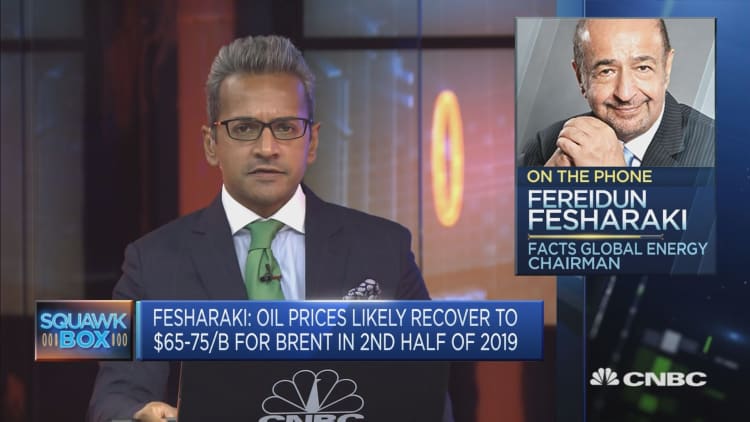
Chances of a U.S.-Iran conflict escalating into something bigger are "very, very high" — though a full-blown war is unlikely, said a former energy advisor to the prime minister of Iran in the late 1970s.
Washington and Tehran nearly came to blows last week after Iran claimed it downed an American drone that entered its territory. The U.S. said its aircraft was operating in international airspace.
"We have to remember Iran is a regional superpower. U.S. says 'I'll put you in a box, please die.' They (Iran) are not going to stay in a box and just die," Fereidun Fesharaki, now chairman of oil and gas consultancy Facts Global Energy, told CNBC's "Squawk Box."
"They will strike back one way or the other; I think chances of tensions becoming bigger is very, very high in the near future," said Fesharaki.
In response to the downing of the U.S. drone, President Donald Trump ordered military strikes against Iranian targets on Thursday — but eventually halted those plans.
Escalating tensions between the two countries sent oil prices higher, with U.S. crude up more than 9% in the week, while the global benchmark Brent gained 5%. Investors fear an attack on Iran, a major oil producer and exporter, would disrupt energy flows from the Middle East — a region that provides more than a fifth of the world's oil output. Both oil indexes continued edging higher on Monday.
Chances of a conflict are at least 50% right now, said Fesharaki. It may not be a "full war," he pointed out, "but conflict which would disrupt (energy) supplies."
If Trump had carried out those military strikes as planned, the geopolitical risk premium on oil prices would have been $5 to $10 a barrel, said Fesharaki. Now, the geopolitical risk premium "is only one or two bucks at the moment, it's not really high enough," he added.

Tensions between the U.S. and Iran have spiked since May last year when the U.S. withdrew from the international 2015 nuclear deal with Iran, and reinstated sweeping sanctions on the Islamic Republic.
The U.S. has also bolstered its military presence in the Middle East — announcing plans to send thousands of troops to the region — and blacklisted Iran's Revolutionary Guard as a terrorist organization.
The June attacks on two oil tankers in the Gulf of Oman near the Strait of Hormuz also added to concerns of a military confrontation between the two countries. Washington blames Tehran for the attacks but Iran has denied those charges.
Iran has in the past threatened to block the Strait of Hormuz — one of the most important waterways in the world, which links crude producers in the Middle East with key markets in the rest of the world. Trump said earlier this month that if Iran were to block the Strait of Hormuz, "it's not going to be closed for long."
The narrow channel is critical to energy security and accounts for approximately 30% of the world's seaborne oil traffic.
More than one-quarter of global liquefied natural gas trade transited the Strait of Hormuz in 2018 and there are limited options to bypass the waterway, according to the U.S. Energy Information Administration.
Asked if Iran might withhold from threats to block the Strait of Hormuz, because it needs to export energy products through the channel, Fesharaki said: "They get a little bit of money but the money is not big enough for them to ... simply give up everything else that President Trump is asking them to."
As for liquefied natural gas, Fesharaki said there are few fundamental concerns due to plenty of supplies and reserves worldwide.
However, panic may hit the LNG market sentiment if the Strait of Hormuz is disrupted, said Fesharaki.
"Supply-wise, will be okay, but the shock to the market or the fear of (it) getting worse, that could send the prices rocketing," he said.
— CNBC's Spencer Kimball and Sam Meredith, and Reuters contributed to this report.

